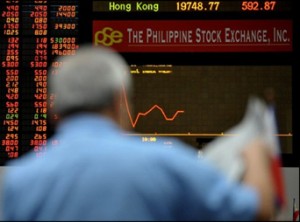As expected, the Philippine stock market reached new heights in April as funds continued to shift from crisis-stricken Europe and a weak United States into safer financial markets across the Asia-Pacific.
Riding on this wave of bullishness, several local companies are looking to capitalize by raising as much money as they can—through initial public offerings (IPOs) and follow-on share sales—lest they miss their chance and the window of opportunity unexpectedly shuts.
Faced with a buffet of investment choices, how can an investor choose which dish to pile on his plate without ending up biting off more than he can chew?
For Jomar Lacson, head of research at brokerage firm Campos Lanuza & Co., an investor, whether he has a sub-P100,000 portfolio or controls a billion-dollar fund, should have a well-defined set of goals.
“Choosing the right stock depends on what you want to achieve,” Lacson said. “Are you considering a speculative play or is your investment horizon farther out?”
The Philippine Stock Exchange (PSE) expects P197 billion in fresh equity to be raised from the local bourse this year, including the two high-profile IPOs by GT Capital Holdings of taipan George Ty and the Gotianuns’ banking arm East West Bank.
GT Capital is raising as much as P24.6 billion from an April IPO, while East West Bank is planning a stock debut of up to P6.63 billion, marking the first time a local bank goes public in eight years.
Apart from companies raising fresh capital for expansion, good valuations make it compelling for companies to sell shares to meet the 10-percent minimum public ownership required by the PSE for continued listing.
In 2013, the bourse will start suspending companies that do not meet this requirement.
“I think the bigger motivator is that the market’s so good [that] if you can’t do it now when you’re a listed company and valuations are so robust, when can you do it?” PSE president Hans Sicat recently remarked.
Lacson said investors looking to make a quick buck should more seriously consider smaller IPOs like East West’s, explaining that these shares are usually offered at significant discounts.
“You are betting on people buying it because there’s a strong upside,” Lacson said.
Depending on market conditions, he said, investors can pocket quick and substantial gains in a matter of weeks or even days.
For more patient individuals, Lacson said GT Capital, which has interests in real estate, banking and the power sector, may be a more attractive prospect.
He cited the example of SM Investments Corp., which held its IPO during a relatively bear market and sold shares at a price most investors at the time viewed as expensive.
“When SMIC went public in 2005, everybody knew that it was not cheap. But what you are looking for is the company’s potential in the long run. You still would have bought SMIC even if you knew the price was high,” he said. “Even if you lost money in the first year or two, if you believe in the company’s strategy, you can double your money.”
SMIC went public at P250 a share and was the biggest local IPO at the time. Today, the company is trading at P670 a share.
First Grade Holdings’ Astro del Castillo, for his part, said investors should also consider the reputation of the group in which a company holding an IPO belongs.
A company’s financial health notwithstanding, a group’s “management background” often play an important role in determining the proper price for a company, Del Castillo explained.
“The ‘non-financials’ are important. Does a company have a lot of corporate governance issues? Have they been transparent with the public, even prior to their IPOs?” he asked.
Del Castillo said that in the case of conglomerates, investors would do best to study the performance of other listed firms in that said particular group of companies.
“The historical background has to be good. You have to check the capability of the owners to make ventures successful,” he said.
The reason for a company’s IPO could also be a good indication of whether buying would be a good bet or not, he added.
“Is the company raising money to expand its business, or are the current shareholders cashing in? Are they just going to leave you hanging once they have sold out?” Del Castillo said.
